The first in an essay series by The Max Levine Ensemble’s David “Spoonboy” Combs.
Ask any DIY musician why they play music or why they go on tour, and they’re probably not going to tell you they’re in it for the money. They’ll say they do it because they love it, or because there’s something inside of them that compels them to hit the road. But money is still part of the picture, and a lack of it can take even small-scale musicians off the road, swiftly and indiscriminately.
Most DIY artists aren’t spending nearly $18,000 on hotels and food like the band Pomplamoose did last year. But that doesn’t mean we don’t face risks.
Say your band’s van breaks down when you’re making less than $100 a night on tour. There’s a good chance that tour is over, or at best, it will be a while till your next one. When gas prices go up, that money’s coming out of your food budget. Packed too many CDs and not enough T-shirts? That’s money lost, too.
I spent the better part of four months on tour in 2014 with my solo project, Spoonboy, and I’ve been touring for more than 12 years with my punk band, The Max Levine Ensemble. I consider myself a part of a strange community of punk and DIY musicians who make music regardless of economic incentives. But no tour can happen without some consideration of money. And since it’s not something we’re prone to bringing up, people outside of our world might not understand how crucial it is, even for artists playing living rooms.
Before DIY bands even begin to think about widely discussed issues like income from online streaming, they’re more likely to be thinking about the basics: gas, vehicle expenses, food, merch, lodging — and one factor that’s a little more nebulous: reciprocity for people who helped them on tour.
I talked to a few musician friends about the lesser-known but fundamental costs of small-scale touring, with the goal of sharing — for both showgoers and bands — what DIY musicians experience on the road.
Gasoline
It gets you around, so you won’t get around it.
On tour, nothing is more certain than the next stop at the gas station. DIY bands easily spend most of their tour money on petroleum.
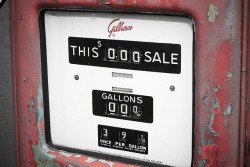 The last several months saw sinking gas prices, but that’s unusual, and already reversing. Jeff Rosenstock — who plays solo and formerly with punk band Bomb the Music Industry — says that traditionally, gas prices have risen much faster than many musicians’ incomes.
The last several months saw sinking gas prices, but that’s unusual, and already reversing. Jeff Rosenstock — who plays solo and formerly with punk band Bomb the Music Industry — says that traditionally, gas prices have risen much faster than many musicians’ incomes.
“Gas prices change more than anything,” Rosenstock says. They “increase so much more than the amount that minimum wage has increased over the past 15 years.”
He’s right. Between June 1999 and June 2014, gas prices rose by 216 percent before they began to slide. The federal minimum wage increased by 41 percent in the same amount of time.
The cost of fuel looms so large that some bands get desperate. Take Chris Moore, who plays in D.C. hardcore bands Coke Bust, Sick Fix and DOC. He says he went to extremes to avoid paying for gas on one of his first tours.
“Me and the roadie in the band would take these five gallon gas containers, put them in contractor bags, sneak around at night, find some poor guy’s car and steal as much gas as possible.” — Chris Moore, Coke Bust
“I was like, ‘All right, we’re gonna steal gas every single night,'” he says. “And that’s how we’re going to make it work.”
Moore’s band at the time, Magrudergrind, bought a hand-pump syphon so they wouldn’t have to slurp gas out of people’s tanks with their mouths, and picked up bags and two large gas canisters.
“Me and the roadie in the band would take these five gallon gas containers, put them in contractor bags, sneak around at night, find some poor guy’s car and steal as much gas as possible,” Moore says.
Eventually, the hardcore band had second thoughts. “It ended up getting so sketchy. We were playing a lot of country towns. Who knows, maybe some of these people [had] guns,” Moore says. “If I caught someone stealing gas from me, I don’t know what I would do. So we just gave up after two weeks. More trouble than it [was] worth.”
Vehicle
Get in the van.
Vehicle expenses can sometimes top gas prices, but they’re far more circumstantial. They depend on questions of renting versus owning and how reliable and fuel-efficient the mode of transportation is.
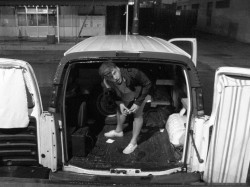 “I’ve always gone back and forth between being in a band that owns its own vehicle to renting something every time we go out,” Moore says. “On the renting side, is it renting something that’s brand new or renting something that belongs to someone? As much as I love saving a little bit of money by renting a vehicle from a friend, there have been so many instances where that vehicle has broken down or it’s so old that its gas efficiency is so bad that we might as well have rented something brand new.”
“I’ve always gone back and forth between being in a band that owns its own vehicle to renting something every time we go out,” Moore says. “On the renting side, is it renting something that’s brand new or renting something that belongs to someone? As much as I love saving a little bit of money by renting a vehicle from a friend, there have been so many instances where that vehicle has broken down or it’s so old that its gas efficiency is so bad that we might as well have rented something brand new.”
You can cut out rental expenses if you own your vehicle, but the liability is a real gamble. Say a deer runs into your car on the highway, knocks a part in your radiator loose and that leads to a busted transmission. There goes your tour fund, and probably a good portion of your savings. (Not that this happened to me. OK, it did.) Plus, the cost of maintaining a van driven tens of thousands of miles a year adds up.
Fuel-efficient vehicles, alternative fuel, driving shorter distances between shows — they’re all useful tricks to cut costs. But paying for gas adds up no matter what.
On my own tours, I’ve tried everything from hitchhiking to scamming fake Greyhound Bus passes to find a way around these costs. But I’ve always ended up in the same place: back in the van.
Food
Meet the chips-and-salsa sandwich.
This one seems obvious. You’ve got to eat. But talk to a touring band about how food is paid for, and you’ll find it’s a hot topic.
“I think everyone in our band at some point skips a meal or two just because we couldn’t afford to be eating out every day,” says Radiator Hospital guitarist Sam Cook-Parrott. Most musicians don’t have the budget to be eating out for every meal, of course — but when you’re living out of your van, you don’t have a choice.
Musicians on tour routinely keep food costs down by flirting with malnutrition.
“We used to get ramen and just crinkle it up in the package and pour the sprinkles on it and have ramen chips. That’s what we would eat for every meal,” Rosenstock says.
 Every band has their version of this, whether it’s peanut butter and jelly or one of my personal favorites: the chips-and-salsa sandwich. Musicians on tour routinely keep food costs down by flirting with malnutrition. Ideally the tour should pay for the food, but it’s not always possible.
Every band has their version of this, whether it’s peanut butter and jelly or one of my personal favorites: the chips-and-salsa sandwich. Musicians on tour routinely keep food costs down by flirting with malnutrition. Ideally the tour should pay for the food, but it’s not always possible.
“If the tour is doing well, then we’ll pay for food out of the tour fund,” Moore says, speaking of his various bands’ routines.“We’ll do a per diem, like a $5 or $10 per day per diem. Or when the band goes out to eat, the band will just pay for it. I kind of prefer that because that means you get to order dessert.”
Even then, food expenses can be a source of interpersonal drama.
“Sometimes people take advantage of it,” Moore says. “There are situations where everyone’s ordered this food except for this last person, and the last person orders two appetizers, a side and a dessert, and you’re like, ‘Damn man, come on!'”
Merch
Spend money to make money.
Merchandise sales account for a big portion of tour income. But producing records, shirts and other goods is also one of a band’s biggest expenses.
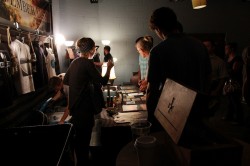 “You’re spending money up front, and then earning it back slowly by selling the records,” Cook-Parrott tells me. “After all the money I spent on the tour and getting ready for the tour, when we got home I had about as much after the tour as when we left. In some ways it’s almost like, ‘Did that even happen? Was this a dream?’”
“You’re spending money up front, and then earning it back slowly by selling the records,” Cook-Parrott tells me. “After all the money I spent on the tour and getting ready for the tour, when we got home I had about as much after the tour as when we left. In some ways it’s almost like, ‘Did that even happen? Was this a dream?’”
Estimating how much to spend on merchandise is always tough, too. “We went on one tour where we only had CDs and then the CDs sold out really quickly,” says Gabrielle Smith of New York bands Eskimeaux, Frankie Cosmos, Bellows and Told Slant. “Then on [our most recent] tour we had T-shirts, vinyl and CDs — and we bought way too many CDs and not enough shirts at all. We ran out of shirts after four days of being on tour.”
But Moore says merch is an inescapable expense.
“It’s sad to say, but you can’t really do a big tour without having some sort of merch to cover costs,” the drummer says. “It doesn’t mean that you need to have 10 different T-shirt designs and beer koozies and shot glasses or whatever, but you need to have something, because there are going to be times when you don’t get anything from the door — or what you get from the door is so small that it’s only enough for a bean burrito at Taco Bell.”
Lodging
We’re crashing on the floor tonight.
Most bands operating even at the edge of DIY learn that hotel rooms are a no-go. You quickly find yourself inside a network of fellow musicians and their friends who can lend you a couch, bed, floor — or, in the best cases, a guest room.
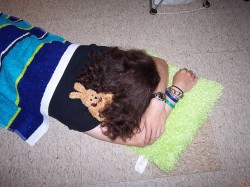 “Spending your money on a hotel every night, especially when you’re a band just starting out, that’s kind of a waste of money,” Rosenstock says. “Even if you’re a band who’s beyond just starting out, that’s a waste of your experience.”
“Spending your money on a hotel every night, especially when you’re a band just starting out, that’s kind of a waste of money,” Rosenstock says. “Even if you’re a band who’s beyond just starting out, that’s a waste of your experience.”
Plus, crashing with people usually leads to new friendships. “We have these really wonderful tour friends who we would never have met otherwise,” Smith says. Almost everyone I spoke to expressed similar sentiments.
“It’s very rare that you’re ever gonna take a plane trip to Lima, Ohio, to visit your friends,” Moore says. “The only time you’re ever gonna do it is when you’re driving to Illinois on tour.”
In the event that you can’t find a place to crash, you’re left with a choice between booking a hotel and getting a good night’s rest in the van at a Walmart parking lot. Depending on how you respond to that quandary, lodging can also be a major cost.
Reciprocity
It’s the backbone of DIY.
In the world of DIY touring, reciprocity is tough to quantify, or even count as an expense. But it’s definitely a big part of the picture.
Here’s how reciprocity works: If your band from D.C. plays a show with an out-of-towner, you play for free so the touring act gets the door money. When you play out of town, local bands do the same for you. That local band could also help book a show for you in their town, and repay you that way.
“I started booking shows for friends, and then I started playing in a band,” says All Dogs bassist Amanda Bartley, “and just through going on tour and making those connections, you become friends with people in bands. And you’re like, ‘I book shows here, could you book a show for me in your town sometime?’”
The informal gift economy attracts a lot of people to DIY, but it can fall short of meeting bands’ needs.
Moore echoes the importance of this arrangement. “I don’t know if I believe in karma, but I think it’s important to pay it forward.”
That informal gift economy attracts a lot of people to DIY, whether it’s for political reasons or just the romance, but it can also fall short of meeting bands’ needs.
“DIY booking feels like a very personal interaction, and it feels like a very favor-based gifting and owing system. It’s very precariously balanced,” Smith says. “When there’s a booking agent involved, it becomes a business interaction that’s sort of missing from the DIY version.”
And that’s where some of the more interesting economic questions start to pop up. While many bands have found success and longevity operating on a strictly DIY model, others might turn to a booking agent or publicist to try and alleviate some of the challenges a band faces in our bleak economic landscape.
To what extent those things are useful solutions really depends on the band. But these days it’s not hard to find bands with one foot in a traditional DIY ethic, and the other in a more professional approach to marketing music.
And that makes sense. As the prevailing music industry model has crumbled, musicians of all stripes have been experimenting with new models for success, and the lines between the DIY and the professional have blurred. So we’re talking about it.
Stay tuned for Combs’ next installment in a series of essays about the DIY music economy.
Photos by Flickr users Incase, Andrew Taylor, Les Chatfield, Will Fisher, Christian Kadluba and baronsquirrel.


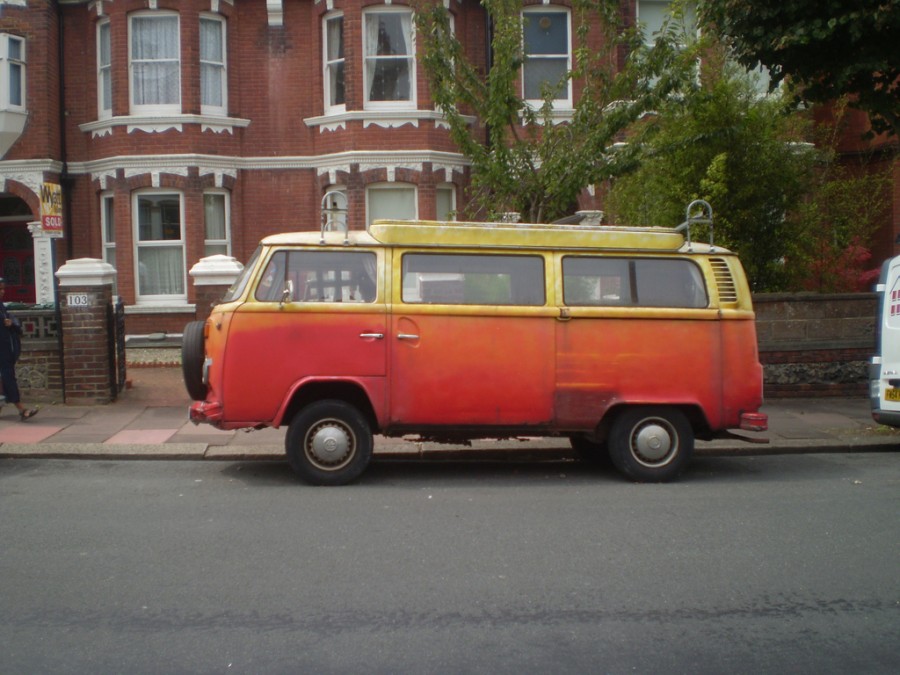
Pingback: Quora()